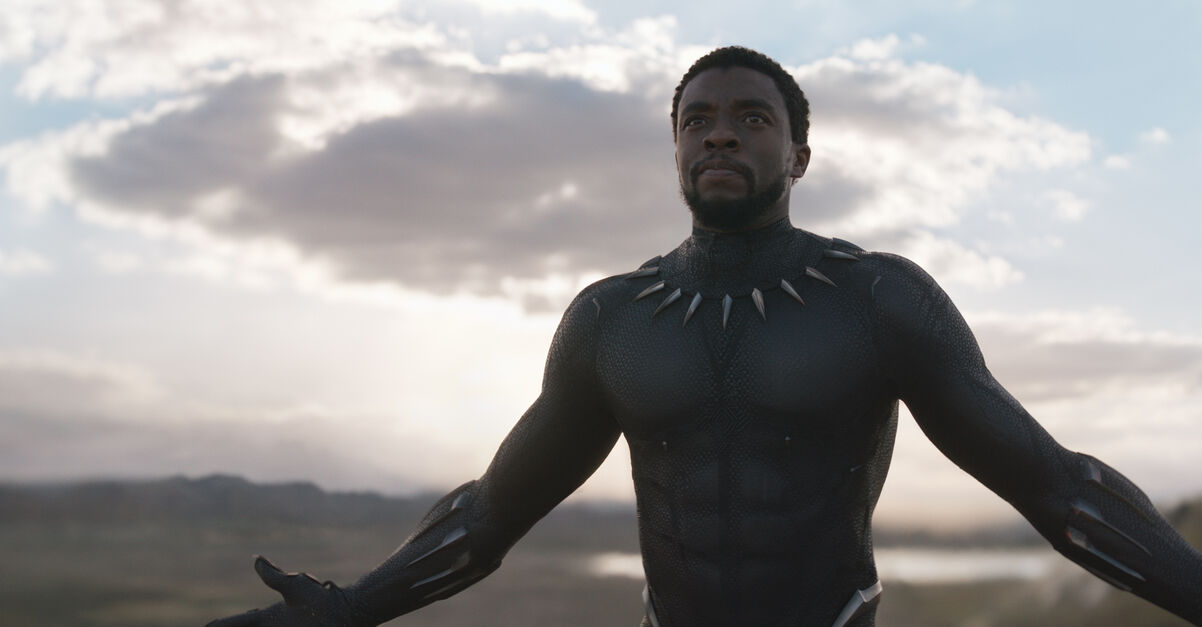In “But How Gay Is It?”, we seek to answer the biggest questions you have about a new movie release in theaters now including, most crucially, the titular question. Does the movie have any queer characters? Are there stories involving same-sex lovers? Which gay icons star in the film? We’re bringing you all that and more.
What is Black Panther?
The latest Marvel movie though perhaps that undersells it Black Panther tells the story of T’Challa, the titular hero, and his ascendancy to the throne in the fictional African nation of Wakanda. Though the rest of the world thinks Wakanda is a third-world country, in truth, Wakanda has tremendous military might and technological prowess. A special metal called vibranium, which Wakanda has stored up in droves, is the key to their success. Unfortunately, with that success comes being targeted: Multiple thieves want to steal vibranium, including the arms dealer Klaue, as well as a mysterious man named Erik Stevens whose connection to T’Challa threatens Wakanda as a whole.
Who’s in it?
Chadwick Boseman plays T’Challa, while Michael B. Jordan plays Erik. Both are great, but the supporting cast steals the show: Lupita Nyong’o as a Wakandan spy and T’Challa’s love interest, Nakia; Danai Gurira as tough-as-nails soldier Okoye; Angela Bassett as Queen Mother of Wakanda, Ramonda; and, in a hilarious turn, Letitia Wright as T’Challa’s super-genius sister Shuri. Throw in Martin Freeman as CIA agent Everett K. Ross (returning from Captain America: Civil War), Andy Serkis as the aforementioned Klaue, current Oscar nominee Daniel Kaluuya as T’Challa’s friend W’Kabi, and Sterling K. Brown as a pivotal (if spoilery) character, and you’ve got one hell of an ensemble.
Why should I see it?
It’s fantastic. Seriously. I’m not a Marvel fan by any stretch (the only other Marvel movie I’d consider great is Captain America: Winter Soldier), and I was blown back by Black Panther. Director Ryan Coogler has achieved a feat on so many levels here. He’s created a Wakanda that feels deeply real like a world that has existed for centuries before this movie and will exist for centuries after. The ensemble is across-the-board terrific, with Jordan, Gurira, and Wright delivering particularly great work.
Shockingly, though, what I was most impressed by was the action. A lot of superhero fights feel the same to me: lots of powers, chaos on the battlefield, good guys win. Wonder Woman’s inventiveness with using its historical location (No Man’s Land during World War I, for instance) is part of why it stood out to me. But Black Panther changes the game. One scene in a club involves a long take that follows multiple characters, multiple styles of fighting, and never once feels forced. Even a car chase scene, the most hoary of action movie tropes, feels refreshing. Coogler and his team use the specific weaponry of Wakanda spears, Black Panther’s claws to change the physics and possibilities of the scene. It’s truly impressive. I can’t wait to see it again just to focus on these scenes to see just how they did it.
But how gay is it?
It’s not. But it almost was.
In an early draft of the script, Coogler and co-writer Joe Robert Cole wrote a flirtatious scene between Gurira’s Okoye and Florence Kasumba’s character, Ayo. In the final film, however, Okoye is with W’Kabi, and the scene first noted as particularly queer in the original screenplay is gone. Cole confirmed that the gay love story was in there at some point, but was unclear as to why it was removed.
It’s an unfortunate removal from a movie that is boundary-pushing in so many other ways one that so effortlessly talks about colonization, the obligation for the powerful to help the powerless, radicalization, and so on. To finally see LGBTQ representation in a Marvel movie would have added another powerful layer to an already powerful film. Black Panther isn’t a worse movie for the removal, but the choice does disappoint.
Will I like this even if I don’t usually like superhero movies or haven’t seen the other Marvel films?
I can only speak for myself, but yes. It’s still got all the hallmarks of a superhero movie, but it’s not so connected with all the Marvel mythology. Coogler basically gets to tell a singular story, with flashbacks filling in the blanks for anyone who didn’t see T’Challa’s debut in Captain America: Civil War. I felt no compulsion to see more non-Black Panther Marvel movies after this, but I sure as hell wanted to see more stories told within the world of Wakanda.
Are the costumes by Ruth E. Carter as great as they look?
They’re divine. Black Panther may not be gay, but you’ll still gay-gasp plenty. There’s one shot in particular that shows all the different tribes of Wakanda, represented by dozens of its citizens. Each one of them has an outfit that relates to their tribe, but also represents them individually. My jaw dropped. It’s staggering work, and Carter has to be a frontrunner for next year’s Best Costume Design Oscar.
Black Panther is in theaters now.
Don't forget to share:
Help make sure LGBTQ+ stories are being told...
We can't rely on mainstream media to tell our stories. That's why we don't lock our articles behind a paywall. Will you support our mission with a contribution today?
Cancel anytime · Proudly LGBTQ+ owned and operated
Read More in Culture
The Latest on INTO
Subscribe to get a twice-weekly dose of queer news, updates, and insights from the INTO team.
in Your Inbox













